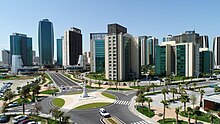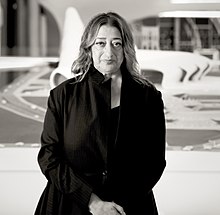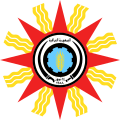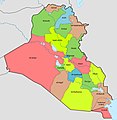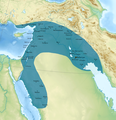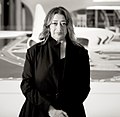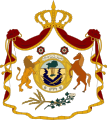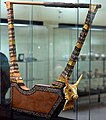Portal:Iraq
The Iraq PortalA view of Baghdad, Iraq
Iraq, officially the Republic of Iraq, is a country in West Asia and in the geopolitical region known as the Middle East. With a population of over 46 million, it is the 31st-most populous country. It is a federal parliamentary republic that consists of 19 governorates. Iraq is bordered by Turkey to the north, Iran to the east, the Persian Gulf and Kuwait to the southeast, Saudi Arabia to the south, Jordan to the southwest, and Syria to the west. The capital and largest city is Baghdad. Iraqi people are diverse; mostly Arabs, as well as Kurds, Turkmen, Assyrians, Armenians, Yazidis, Mandaeans, Persians and Shabakis with similarly diverse geography and wildlife. Most Iraqis are Muslims – minority faiths include Christianity, Yazidism, Mandaeism, Yarsanism and Zoroastrianism. The official languages of Iraq are Arabic and Kurdish; others also recognized in specific regions are Turkish, Suret, and Armenian. Modern Iraq dates to 1920, when a Mandate was created by League of Nations. A British-backed monarchy was founded in 1921 under Faisal. The Hashemite kingdom got independence from the UK in 1932. In 1958, the kingdom was overthrown and a republic was established. Iraq was ruled by the Ba'ath Party from 1968 to 2003, led by Al-Bakr and then by Saddam Hussein, as a one-party state. Iraq engaged in war with Iran from 1980 to 1988 and another war from 1990 to 1991, resulting from the invasion of Kuwait. An invasion launched by a US-led coalition as part of its "War on Terror" in 2003, sparking a war, resulted in the defeat of Ba'athists and Saddam's execution and continued with an insurgency and secratarian civil war. U.S. troops began withdrawing in 2008 and war officially ended in 2011. The subsequent continuing repression and sectarian policies of Nouri al-Maliki's government caused protests, after which a coalition of Ba'athist and Sunni militias took up arms during a campaign. The climax of the campaign was the offensive by the ISID that marked its rapid territorial expansion, prompting the return of American troops to fight the war, which lasted until 2017. Iran has also intervened since 2014, expanding its influence through sectarian parties and Khomeinist militia groups, triggering widespread protests. (Full article...) Selected article -The economy of Iraq is dominated by the oil sector, which has provided about 99.7% of foreign exchange earnings during its modern history. As of 2021, the oil sector provides about 92% of foreign exchange earnings. Iraq's hitherto agrarian economy underwent rapid development following the 14 July Revolution (1958) which overthrew the Hashemite Iraqi monarchy. It had become the third-largest economy in the Middle East by 1980. This occurred in part because of the Iraqi government's successful industrialization and infrastructure development initiatives in the 1970s, which included irrigation projects, railway and highway construction, and rural electrification. In the 1980s, financial problems caused by massive expenditures in the Iran-Iraq War and damage to oil export facilities by Iran led the Ba'athist government to implement austerity measures, to borrow heavily, and to later reschedule foreign debt payments. Iraq suffered economic losses of at least $80 billion from the war. In 1988, the hostilities ended. Oil exports gradually increased with the construction of new pipelines and restoration of damaged facilities, but again underwent a sharp decline after the Persian Gulf War. GDP dropped to one-fourth of the country's 1980 gross domestic product and continued to decline under postwar international sanctions, until receiving aid from the U.N. Oil-for-Food Programme in 1997. (Full article...)Selected pictureDid you know...
Selected biography -Dame Zaha Mohammad Hadid DBE RA (Arabic: زها حديد Zahā Ḥadīd; 31 October 1950 – 31 March 2016) was an Iraqi-British architect, artist and designer, recognized as a major figure in architecture of the late-20th and early-21st centuries. Born in Baghdad, Iraq, Hadid studied mathematics as an undergraduate and then enrolled at the Architectural Association School of Architecture in 1972. In search of an alternative system to traditional architectural drawing, and influenced by Suprematism and the Russian avant-garde, Hadid adopted painting as a design tool and abstraction as an investigative principle to "reinvestigate the aborted and untested experiments of Modernism [...] to unveil new fields of building". She was described by The Guardian as the "Queen of Curves", who "liberated architectural geometry, giving it a whole new expressive identity". Her major works include the London Aquatics Centre for the 2012 Olympics, the Broad Art Museum, Rome's MAXXI Museum, and the Guangzhou Opera House. Some of her awards have been presented posthumously, including the statuette for the 2017 Brit Awards. With several awards and accolades to her name, she has also been recognized by the 2013 Forbes List as one of the "World's Most Powerful Women" Several of her buildings were still under construction at the time of her death, including the Daxing International Airport in Beijing, and the Al Wakrah Stadium (now Al Janoub) in Qatar, a venue for the 2022 FIFA World Cup. (Full article...)
General imagesThe following are images from various Iraq-related articles on Wikipedia.
ListsTopicsCategoriesRelated portalsReligions in Iraq Arab states WikiProjectsThings you can do
Associated WikimediaThe following Wikimedia Foundation sister projects provide more on this subject:
Discover Wikipedia using portals | ||||||||





